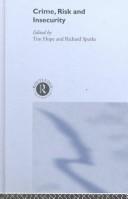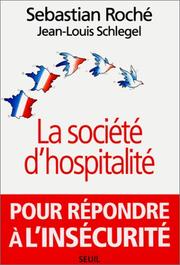| Listing 1 - 10 of 26 | << page >> |
Sort by
|
Book
ISBN: 0128009233 0128020822 1322097658 9781322097657 Year: 2015 Publisher: Oxfordshire, [England] ; Waltham, Massachusetts : Elsevier,
Abstract | Keywords | Export | Availability | Bookmark
 Loading...
Loading...Choose an application
- Reference Manager
- EndNote
- RefWorks (Direct export to RefWorks)
Personal Security: Keeping Yourself and Your Family Safe is a video presentation. Length: 26 minutes. In Personal Security: Keeping Yourself and Your Family Safe, presenter Rosalind W. Jackson provides personal security guidelines for securing your workplace, home, and automobile. This presentation addresses topics such as assault prevention and deterrence, physical resistance, and personal safety techniques. It also covers issues such as theft and harassment, and provides safety tips for automated teller machines (ATMs), hotels, elevators, automobiles, and at home with children. It touches
Security (Psychology) --- Emotional insecurity --- Emotional security --- Insecurity (Psychology) --- Psychology, Applied
Book
ISBN: 9780415464550 9780203891582 9781134040315 9781134040353 9781134040360 9780415599795 0415599792 0415464552 Year: 2009 Publisher: London Routledge
Abstract | Keywords | Export | Availability | Bookmark
 Loading...
Loading...Choose an application
- Reference Manager
- EndNote
- RefWorks (Direct export to RefWorks)
Technologies of InSecurity examines how general social and political concerns about terrorism, crime, migration and globalisation are translated into concrete practices of surveillance and securitisation of everyday life. The book is based on contributions from an international panel of leading criminologists, lawyers and surveillance scholars and provides new insights about how broader political issues are translated into concrete and local practices of social control and exclusion.
Internal security --- Security systems --- Security (Psychology) --- Security measures --- Burglary protection --- Emotional insecurity --- Emotional security --- Insecurity (Psychology) --- Psychology, Applied --- Security, Internal --- Insurgency --- Subversive activities
Book
ISBN: 1443853291 9781299974029 1299974023 9781443853293 1443849790 9781443849791 Year: 2013 Publisher: Newcastle
Abstract | Keywords | Export | Availability | Bookmark
 Loading...
Loading...Choose an application
- Reference Manager
- EndNote
- RefWorks (Direct export to RefWorks)
Women Taking Risks in Contemporary Autobiographical Narratives explores the nature and effects of risk in self-narrative representations of life events, and is an early step towards confronting the dearth of analysis on this subject. The collection focuses on risk-taking as one of women's articulations of authorial agency displayed in literary, testimonial, photographic, travel and film documentary forms of autobiographical expression in French. Among many themes, the book fosters discussion on matters of courage, strength, resilience, freedom, self-fulfillment, political engagement, compassio
Women --- Risk-taking (Psychology) --- Security (Psychology) --- Emotional insecurity --- Emotional security --- Insecurity (Psychology) --- Psychology, Applied --- Risk behavior --- Risky behavior --- Taking risks --- Human behavior --- Psychology. --- Mental health
Book
ISBN: 1108311296 1108291406 1108314295 1108418767 1108407862 Year: 2018 Publisher: Cambridge : Cambridge University Press,
Abstract | Keywords | Export | Availability | Bookmark
 Loading...
Loading...Choose an application
- Reference Manager
- EndNote
- RefWorks (Direct export to RefWorks)
The Poetics of Insecurity turns the emerging field of literary security studies upside down. Rather than tying the prevalence of security to a culture of fear, Johannes Voelz shows how American literary writers of the past two hundred years have mobilized insecurity to open unforeseen and uncharted horizons of possibility for individuals and collectives. In a series of close readings of works by Charles Brockden Brown, Harriet Jacobs, Willa Cather, Flannery O'Connor, and Don DeLillo, Voelz brings to light a cultural imaginary in which conventional meanings of security and insecurity are frequently reversed, so that security begins to appear as deadening and insecurity as enlivening. Timely, broad-ranging, and incisive, Johannes Voelz's study intervenes in debates on American literature as well as in the interdisciplinary field of security studies. It fundamentally challenges our existing explanations for the pervasiveness of security in American cultural and political life.
American fiction --- American literature --- History and criticism. --- Themes, motives. --- Security (Psychology) --- Emotional insecurity --- Emotional security --- Insecurity (Psychology) --- Psychology, Applied --- In literature.

ISBN: 0415243440 9780415243445 Year: 2000 Publisher: London Routledge
Abstract | Keywords | Export | Availability | Bookmark
 Loading...
Loading...Choose an application
- Reference Manager
- EndNote
- RefWorks (Direct export to RefWorks)
Fear of crime --- Security (Psychology) --- Victims of crimes --- Peur du crime --- Insécurité --- Victimes d'actes criminels --- Fear of crime. --- Victims of crimes. --- Security (Psychology). --- Insécurité --- Crime --- Crime victims --- Victimology --- Victims --- Emotional insecurity --- Emotional security --- Insecurity (Psychology) --- Psychology, Applied
Book
ISBN: 0814725481 9780814725481 9780814708439 0814708439 9780814708439 Year: 2013 Publisher: New York, NY
Abstract | Keywords | Export | Availability | Bookmark
 Loading...
Loading...Choose an application
- Reference Manager
- EndNote
- RefWorks (Direct export to RefWorks)
In Rhetorics of Insecurity, Zeynep Gambetti and Marcial Godoy-Anativia bring together a select group of scholars to investigate the societal ramifications of the present-day concern with security in diverse contexts and geographies. The essays claim that discourses and practices of security actually breed insecurity, rather than merely being responses to the latter. By relating the binary of security/insecurity to the binary of neoliberalism/neoconservatism, the contributors to this volume reveal the tensions inherent in the proliferation of individualism and the concurrent deployment of techniques of societal regulation around the globe. Chapters explore the phenomena of indistinction, reversal of terms, ambiguity, and confusion in security discourses. Scholars of diverse backgrounds interpret the paradoxical simultaneity of the suspension and enforcement of the law through a variety of theoretical and ethnographic approaches, and they explore the formation and transformation of forms of belonging and exclusion. Ultimately, the volume as a whole aims to understand one crucial question: whether securitized neoliberalism effectively spells the end of political liberalism as we know it today.
Neoliberalism. --- Violence. --- Security, International. --- Security (Psychology) --- Neo-liberalism --- Liberalism --- Violent behavior --- Social psychology --- Collective security --- International security --- International relations --- Disarmament --- International organization --- Peace --- Emotional insecurity --- Emotional security --- Insecurity (Psychology) --- Psychology, Applied

ISBN: 2020378566 Year: 2000 Publisher: Paris Seuil
Abstract | Keywords | Export | Availability | Bookmark
 Loading...
Loading...Choose an application
- Reference Manager
- EndNote
- RefWorks (Direct export to RefWorks)
Security (Psychology) --- Insécurité --- France --- Social conditions --- Conditions sociales --- Marginality, Social --- Risk perception --- Social integration --- Inclusion, Social --- Integration, Social --- Social inclusion --- Sociology --- Belonging (Social psychology) --- Emotional insecurity --- Emotional security --- Insecurity (Psychology) --- Psychology, Applied --- Awareness, Risk --- Risk awareness --- Perception --- Exclusion, Social --- Marginal peoples --- Social exclusion --- Social marginality --- Assimilation (Sociology) --- Culture conflict --- Social isolation --- People with social disabilities --- Insécurité
Book
ISBN: 9054542055 Year: 2002 Publisher: Den Haag Boom juridische uitgevers
Abstract | Keywords | Export | Availability | Bookmark
 Loading...
Loading...Choose an application
- Reference Manager
- EndNote
- RefWorks (Direct export to RefWorks)
122 Criminaliteit --- Crime. --- Law enforcement. --- Security (Psychology) --- Victims of crimes. --- Security (Psychology). --- Crime --- Law enforcement --- Victims of crimes --- Crime victims --- Victimology --- Emotional insecurity --- Emotional security --- Insecurity (Psychology) --- Enforcement of law --- City crime --- Crime and criminals --- Crimes --- Delinquency --- Felonies --- Misdemeanors --- Urban crime --- Social aspects --- Victims --- Psychology, Applied --- Criminal justice, Administration of --- Social problems --- Criminal law --- Criminals --- Criminology --- Transgression (Ethics) --- Policing
Book
ISBN: 1526121034 152610816X 9781526108173 1526108178 9781526108166 9781784995300 9781784995317 Year: 2017 Publisher: Manchester, England : Manchester University Press,
Abstract | Keywords | Export | Availability | Bookmark
 Loading...
Loading...Choose an application
- Reference Manager
- EndNote
- RefWorks (Direct export to RefWorks)
This volume critically analyses the contemporary home and its close relationship to fear and security, a relationship fuelled by the corporate and political manufacturing of fear, the triumph of neoliberal models of home-ownership and related modes of social individualisation and risk that permeate contemporary society.
Security (Psychology) --- Home --- Fear --- Dwellings --- Emotional insecurity --- Emotional security --- Insecurity (Psychology) --- Psychology, Applied --- Housing security --- Residential security --- Psychological aspects. --- Social aspects. --- Security measures. --- Architecture. --- Burglary. --- Culture of fear. --- Homeownership. --- Housing studies. --- Neoliberalism. --- Socio-legal Studies. --- Urban criminology. --- Urban geography. --- Urban studies.
Book
ISBN: 9789004443266 9004443266 9789004443273 9004443274 Year: 2021 Publisher: Leiden ; Boston : BRILL,
Abstract | Keywords | Export | Availability | Bookmark
 Loading...
Loading...Choose an application
- Reference Manager
- EndNote
- RefWorks (Direct export to RefWorks)
"In A need for Religion: Insecurity and Religiosity in the Contemporary World Francesco Molteni tries to answer one of the broadest questions for scholars of religion: why is religiosity declining in developed countries? He does so by inspecting all the different nuances of the insecurity theory, which links the feeling of security typical of modern societies with the diminished need for religion as source of reassurance, support and predictability. in this respect, he notes that much of the evidence is far less clear than expected and that secularization processes are at an advanced stage only in a rather small group of worldwide countries"--
Security (Psychology) --- Religiousness --- Secularism --- 316:2 "20" --- Ethics --- Irreligion --- Utilitarianism --- Atheism --- Postsecularism --- Secularization (Theology) --- Religiosity --- Christian life --- Emotional insecurity --- Emotional security --- Insecurity (Psychology) --- Psychology, Applied --- 316:2 "20" Godsdienstsociologie--21e eeuw. Periode 2000-2099 --- Godsdienstsociologie--21e eeuw. Periode 2000-2099 --- Religiousness. --- Secularism. --- Religious life
| Listing 1 - 10 of 26 | << page >> |
Sort by
|

 Search
Search Feedback
Feedback About UniCat
About UniCat  Help
Help News
News